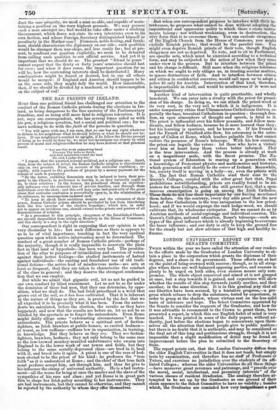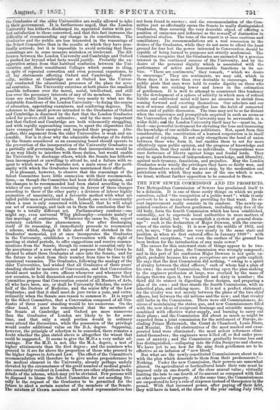LONDON UNIVERSITY : REPORT OF TEE SENATE'S COMMITTEE.
Twin within the year we have called the attention of our readers to the efforts made by the Graduates of London University to ob- tain a place in the corporation which grants the diplomas of their degrees, and a share in its government. These efforts are at last on the lioint of being crowned with success ; though, as in all strug- gles where there are well-balanced opposing parties, and reasons in plenty to be urged on both sides, even success means only com- promise. The whole object conceived and aimed at is not grasped at once, but a step towards it is gained, and experience will show whether the results of this step forwards justify another, and then another, in the same direction. It is in this gradual way that all our liberties have been secured, by a tentative progress,—a pro- gress which refuses to drop the substance, tested by experience, in order to grasp at the shadow, whose virtues rest on the less solid basis of inference and hope. The Select Committee appointed by the Senate to consider the requests of the Graduates, and how far it was advisable to recommend to the Crown to grant them, have presented a report, in which this our English habit of mind is very marked. It was printed in some of the daily papers, without au- thority,just before the elections began to concentrate upon them- selves all the attention that most people give to public matters ; but there is no doubt that it is authentic, and may be considered as the final act of this long and pertinacious struggle, though it is not impossible that a slight modification of detail may be found an improvement before the plan be submitted to the Secretary of State.
The report points ont, that the London University differs from the older English Universities in that it does not teach, but simply tests by examination, and therefore has no staff of Professors or Tutors, and exercises no jurisdiction over the students of its affi- liated Colleges ; whereas the older Universities do all these things —have moreover great revenues and patronage, and "preside over the moral, social, intellectual, and pecuniary interests" of the various classes of resident Graduates. The analogy therefore at- tempted to be set up by the Graduates as one ground of their claim appears to the Select Committee to have no validity ; besides which, the Graduates are reminded how very insignifioant a part the Graduates of the older Universities are really allowed to take in their government. It is furthermore urged, that the London University has hitherto discharged its appointed duties with per- fect satisfaction to those concerned, and that this fact increases the difficulty of recommending any change in its constitution. The Graduates and the public are less interested in the reasonings of the Select Committee than in the results at which they have prac- tically arrived ; but it is impossible to avoid noticing that these reasonings are in some measure mistaken or irrelevant. The dif- ference between the London University and Cambridge and Oxford is pushed far beyond what facts would justify. Probably the ex- aggeration arises- from that habitual confusion between the Uni- versities and ...their constituent Colleges which seems to cling, in spite of repeated correction and even personal experience, to all lay statements affecting Oxford and Cambridge. Practi- cally, neither at Cambridge nor at Oxford has the Univer- sity conducted the educational processes of the place for seve- ral centuries. The University exercises at both places the smallest possible influence over the moral, social, intellectual, and still less over the pecuniary interests of any of its members. Its func- tions are really limited in practice very nearly to what are the statutable functions of the London University—to fixing the course of educatipn, appointing examiners, and conferring degrees. The reference to the small powers intrusted to the Graduates of Oxford and Cambridgeis disarmed by the fact that the London Graduates asked for powers still less extensive ; and by the more important fact that Oxford and Cambridge are both vehemently struggling, and with rapidly approaching success, to upset the oligarchies that have cramped their energies and impeded their progress. Alto- gether, this argument from the older Universities is weak and un- tenable. Nor is it clear why the admirable discharge of its duties by the Senate considered as all examining board should operate to the prevention of the incorporation of the University Graduates as a partially self-governing body, since that incorporation would be in no way likely to interfere with those duties, but would enable the University to discharge others, which the Senate has hitherto been incompetent or unwilling to attend to, and a failure with re- spect to which was, if we mistake not, a main cause of the perti- nacity with which the Graduates have maintained their efforts.
It is pleasant, however, to. observe that the reasonings of the Select Committee have little connexion with their recommenda- tions —aa though the Committee had been divided in opinion, and the changes to be recommended had been stated according to the wishes of one party and the reasoning in favour of these changes according to those of the other party; a division of labour highly promotive of unanimity, and a favourite method with what are called public men of practical minds. Indeed, one sees it constantly when a man is only coneerned with himself, that be will adopt one set of reasonings, and tack on to them the conclusion that be- longs to a totally different set. Parliamentary candour—one might say, even universal Whig philosophy—consists mainly of this marriage of contraries. Whatever the cause be,' this report Certainly exhibits the phenomenon. For after discharging itself of its reasoning, it immediately proceeds to recommend a scheme, which, though it falls short of that sketched in the Graduates' memorial, yet at once incorporates the Graduates in the University, establishes a Convocation with the right of meeting at stated periods, to offer suggestions and receive commu- nications from the Senate, though its consent is essential only for the acceptance of a new charter ; and proposes that the Crown be advised to admit three Graduates at once into the Senate, and for the future to select from their number from time to time to fill occasional vacancies. The Graduates, following the analogy of the older Universities, had wished that all Graduates of three years' standing should be members of Convocation, and that Convocation should meet under its own officers whenever and wherever they saw occasion, to hold discussion and record its opinion. The Select Committee propose that Convocation consist of all Masters of Arts, all who have been, are, or shall be University Scholars, the senior half of the Doctors of? Medicine, and the senior fifty of the Law Graduates ; and that it shall meet de jure twice a year, and extra- ordinarily when the Senate sees reason to summon it. It is urged by the Select Committee, that a Convocation composed of all Gra- duates of three years' standing would be too numerous. On the other hand, it must be remembered that the members of the Senate at Cambridge and Oxford are more numerous than the .Graduates of London are likely to be for some time, and that only a small portion would in ordinary cases attend the discussions, while the possession of the privilege would confer additional value on the B.A. degree. Supposing, however, the principle of selection to be conceded, there remains a doubt whether the plan stated above is altogether the wisest that could be suggested. It seems to give the M.D.s a very unfair ad- vantage. For the M.D. is not, like the N.A. degree, a test of higher attainments than the first degree ; and the numbers who proeeed to it are far above the proportion of those who proceed to the higher degrees in Arts and Law. The effect of the Committee's recommendation will therefore be to give undue preponderance to the medical element in the University, already perhaps unduly elevated by the circumstance of the great number of medical gradu- ates constantly resident in London. There are other objections to the details of the scheme, which may yet be obviated. Few persons will be disposed to blame the Select Committee for not acceding lite- rally to the request of the Graduates to be permitted for the future to elect a certain number of the members of the Senate. The mixture of Crown nominees and elected representatives has not been found to answer ; and the recommendation of the Com- mittee just as effectually opens the Senate to really distinguished Graduates, thus securing the very desirable object of offering a position of eminence and influence as the reward: of distinction in academical studies. The tone.of the report is at once cautious and conciliatory. Its recommendations are a real concession to the desires of the Graduates, while they do not seem to afford the least ground for fear lest the power intrusted to Convocation should be capable of being turned to purposes not strictly academical. The Committee recognize that the Graduates are animated by a genuine interest in the continued success of the University, and by the desire of the personal dignity which is associated with the performance of active and honourable functions in its ser- vice. " These are sentiments," they remark, " which we desire to encourage." They are sentiments, we may add, which in these days it is more than ever desirable to encourage. Many public posts that once were held to confer dignity on those who ,filled them are sinking lower and lower in the estimation of gentlemen. It is well to attempt to counteract this tendency by the development of a sphere of activity in which men of refined habits and cultivated mind will have no occasion to shrink from coining forward and exerting themselves. Our scholars and our men of science should not altogether lose the habit of concerted action and of public discussion. The time may not be so far distant when the experience and promptitude acquired in such an arena as the Convocation of the London University may be serviceable in a wider field ; ani the London University itself may be—must be, in- deed—one powerful instrument for elevating the tone and increasing the knowledge of our middle-class politicians. But, apart from this consideration, the constitution of a learned corporation is in itself a ground of rejoicing. It not only strengthens the bond of union between those who form it, but enables them to act far more effectively upon public opinion, and the progress of knowledge and civilization, than they could do as individuals. Corporations were once fortresses of liberty against kings and feudal lords. They may be again fortresses of independence, knowledge, and liberality, against mob-tyranny, fanaticism, and prejudice. May the London Graduates wear wisely the privileges they have so fairly won, and prove themselves worthy of the next step, by the moderation and patriotism with which they make use of the one which is now, we trust, without further opposition to be conceded to them.



























 Previous page
Previous page